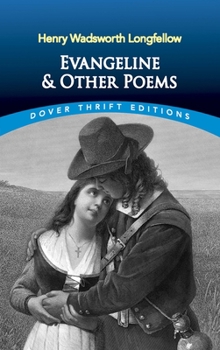Evangeline and Other Poems
Select Format
Select Condition 
Book Overview
It has been said that a copy of Longfellow's narrative poem Evangeline could be found in every literate household in America in the nineteenth century. Certainly its poignant romance touched many hearts and stirred deepening interest in the Maine-born Harvard educator who, in his lifetime, would become America's most famous poet. This book contains the complete Evangeline and a number of other widely admired Longfellow poems.
Included...
Format:Paperback
Language:English
ISBN:0486282554
ISBN13:9780486282558
Release Date:April 1995
Publisher:Dover Publications
Length:80 Pages
Weight:0.20 lbs.
Dimensions:0.2" x 5.2" x 8.3"
Age Range:14 years and up
Grade Range:Grade 9 and higher
Customer Reviews
2 ratings
"Evangeline" is one of the only poems in the English canon in dactylic hexameter
Published by Thriftbooks.com User , 16 years ago
This Dover Thrift Edition makes an economical and convenient introduction to the work of Heendry Wadsworth Longfellow (1807-1882), the American poet who sort of provided the antithesis to Walt Whitman by always looking back to the continental European canon in writing verse on American themes. The volume contains his long poem "Evangeline" and is rounded out with 9 shorter poems. "Evangeline" (1847) is a long poem in dactylic hexameters on the expulsion of the Acadians, the French settlers of Nova Scotia who were forced out by the British in 1755. The poem opens with a depiction of happy life in an Acadian village, around the time that the lovely maiden Evangeline is betrothed to the handsome blacksmith's son Gabriel. Immediately after, the British military comes in, and the couple are separated. Evangeline spends long years searching for Gabriel from Louisiana to Michigan and on to Philadelphia. Besides reminding his contemporary readers of the historical tragedy of the Acadian expulsion, "Evangeline" seems to be Longfellow's tribute to the North American continent and its diversity from the chilly zones of eastern Canada to the feverish bayous of the Cajun land. I enjoyed the plot, and Longfellow is to be praised for successfully creating a long poem in English in dactylic hexameters, as this metre is not at all appropriate for English. I was surprised to see that dactylic hexameter lacks a certain gestalt that other metres have; I love to memorize verse, but little of "Evangeline" could be committed to memory when written in this verse form. Little of the remaining poems in this volume appeal to me, as I'm not a big fan of typical English rhymed poetry of this period. Nonetheless, "The Cross of Snow", which Longfellow wrote in memory of his second wife, is quite moving. "Divina Commedia", a series of six sonnets the poet wrote while translating Dante, have some interesting metaphors.
EVANGELINE and the Inscrutable Will of God
Published by Thriftbooks.com User , 16 years ago
The 1995 Dover paperback EVANGELINE AND OTHER POEMS is a Henry Wadsworth Longfellow sampler. It contains ten poems or excerpts, both narrative and lyric. The 1847 narrative EVANGELINE takes up over 80% of the total text. This is not a critical edition. It has only one introductory note, with special attention to the dactylic hexameter verse used by Henry Wadsworth Longfellow in both EVANGELINE and THE COURTSHIP OF MILES STANDISH. The author's best known example of the dactylic hexameter verse in English (lifted not always happily from classical Greek and Latin) is the first line of EVANGELINE: "This is the forest primeval. The murmuring pines and the hemlocks..." This review is about only the poem EVANGELINE: A TALE OF ACADIE. EVANGELINE is as much a religious poem as Francis Thompson's "The Hound of Heaven" or Gerard Manley Hopkins's "The Wreck of the Deutschland" or "Margaret, Are You Grieving." Like the ILIAD, EVANGELINE's message is that, come what may, the will of God will be done. And like Saint John's Gospel, the message of Longfellow's poem is that God's will can mean that a hero or heroine must undergo undeserved suffering. The poem begins on the peaceful French speaking shores of Maritime Canada in the autumn of 1755. Generations earlier, rugged pioneers had emigrated from Normandy and wrested a living from Acadia (today's Nova Scotia) on difficult lands bordering the ferocious tides of the Bay of Fundy. Richest of the farmers of the little village of Grand-Pre is the 70 year old widower Benedict Bellefontaine. He has a 17-year old daughter Evangeline. In the evening their engagement to marry is solemnly inscribed by the local notary. Next morning father and daughter open their house to receive the congratulations of neighbors. Why have British ships anchored offshore the past four days? At noon the men of Grand-Pre find out; they are summoned to assemble in the church by the British military governor, where they are made prisoners pending deportation. On national security grounds they are informed that every last Acadian will be shipped off to British colonies to the South. For France still controls the St. Lawrence River, Quebec, Montreal and much else and Britain regards the conquered Acadians as an alien, disloyal threat to the English-speaking colonies. All Acadian property is forfeit to the Crown. All houses are burned to the ground. Among the men held prisoner are Evangeline's fiance Gabriel Lajeunesse and his anti-British blacksmith father Basil. The Acadians are essentially apolitical. If the British leave them and their Catholic religion in peace, they are too busy farming and fishing to go to war for or against anybody. But their priest says that somehow this forced migration is the will of God, undeserved and unjust though it be. They must accept it patiently. A second tragedy is that the deported Acadians are hustled higgledy-piggledy onto the waiting British vessels. Father is separated from daughter, husband fr





